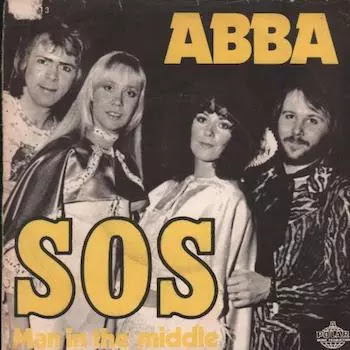Escrita por Bjorn Ulvaeus, Benny Andersson e Stig Anderson, foi gravada em 22 e 23 de agosto de 1974, no Glen Studio em Langangen e lançada em 21 de abril de 1975 no disco ABBA. Sairia também em compacto em junho de 1975 com Man in the middle como Lado B. Agnetha Faltskog cantou os vocais principais. Foi o maior hit internacional da banda desde Waterloo. Começa com uma introdução de piano e logo entra o primeiro verso. Possui uma forte influencia do som de Phil Spector, Wall of sound e da melodias dos Beach Boys. Ulvaeus disse que ap;os 3 anos tentando encontrar um estilo que os definissem, finalmente conseguiram com S.O.S. Essa é uma canção pura do ABBA, em se falando de estilo. Pete Townshend disse que estava ouvindo uma música no rádio nos Estados Unidos e pensando quem era a banda, se era ABBA. Mas segundo ele, já era tarde, ele já havia sido tragado pra da canção, que ele disse ser fantástica, com um fantástico bass drum e toda o arranjo. Foi número 1 na Australia, Bélgica, Nova Zelandia, Africa do Sul e Alemanha Ocidental. Foi número 2 na Itália, Holanda, Noruega, Austria e Zimbabwe. Foi número 3 na Suíça e número 4 na Irlanda. Número 6 no Reino Unido e número 7 na Dinamarca. Número 9 no Canadá e 10 na França e número 15 no Billboard Hot100. Foi regravada por John Frusciante, Peter Cetera, Chris de Burgh e Cher, entre outros artistas. Agnetha Faltskog fez os vocais principais. Anni-Frid Lyngstad fez os backing vocals. Bjorn Ulvaeus tocou guitarra e Benny Andersoon tocou teclado e sinterizador.
A letra;
Where
are those happy days
They seem so hard to find
I try to reach
for you
But you have closed your mind
Whatever happened to our love?
I
wish I understood
It used to be so nice
It used to be so good
So when you're near me
Darling,
can't you hear me, S.O.S.
The love you gave me
Nothing else can
save me, S.O.S.
When you're gone
How can I even try
to go on?
When you're gone
Though I try, how can I carry on?
You seemed so far away
Though you
were standing near
You made me feel alive
But something died, I
fear
I really tried to make it up
I wish
I understood
What happened to our love?
It used to be so good
So when you're near me
Darling,
can't you hear me, S.O.S.
The love you gave me
Nothing else can
save me, S.O.S.
When you're gone
How can I even try
to go on?
When you're gone
Though I try, how can I carry on?
So when you're near me
Darling,
can't you hear me, S.O.S.
And the love you gave me
Nothing else
can save me, S.O.S.
When you're gone
How can I even try
to go on?
When you're gone
Though I try, how can I carry on?
When you're gone
How can I even try
to go on?
When you're gone
Though I try, how can I carry on?
A versão do ABBA:
A versão das Little Quircks:
A versão de Mike Massé e Jeff Hall:















